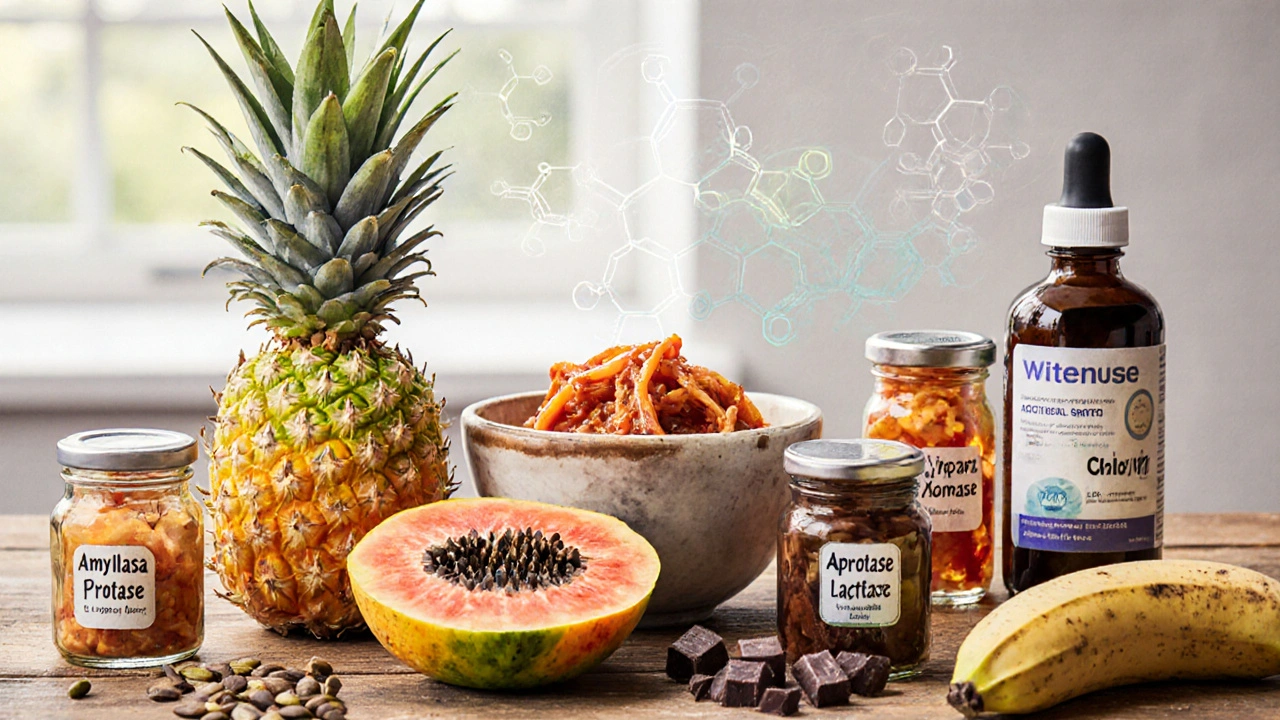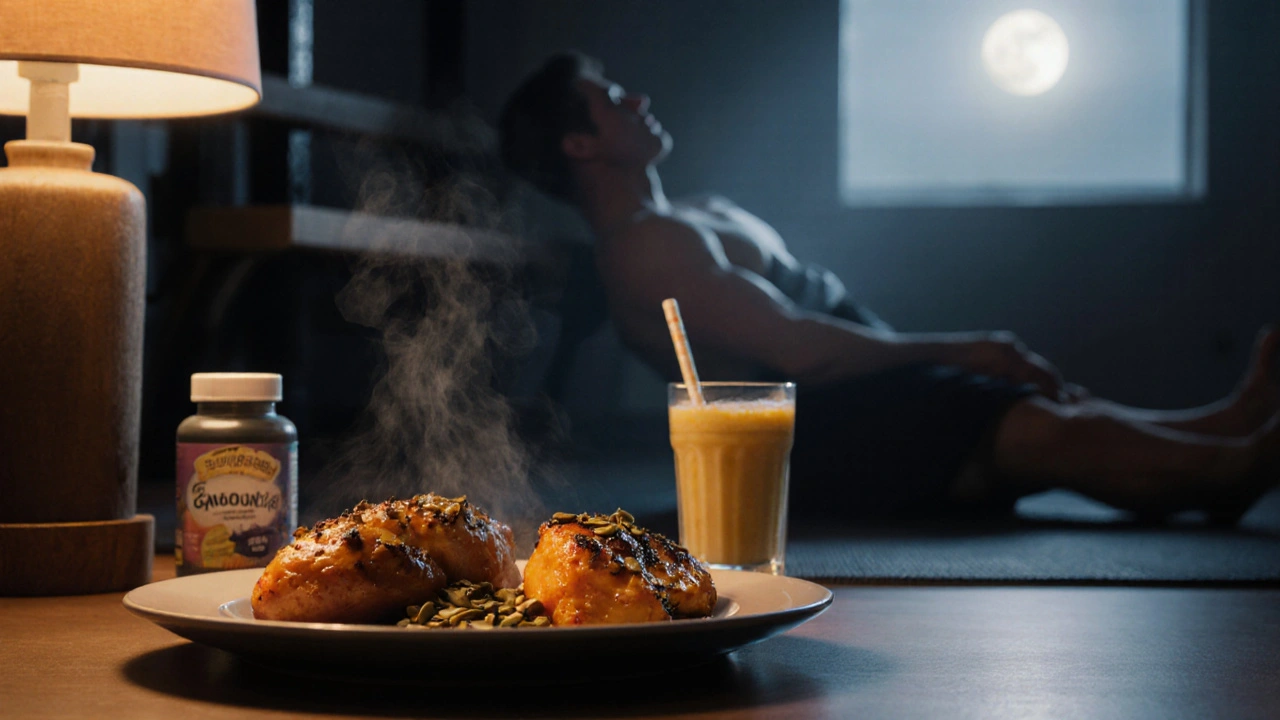Athletic Enzyme Performance Calculator
Enter your details and click "Analyze" to see how enzyme activity may affect your performance.
When you push your body to the limit, you expect every system to work like a well‑oiled machine. Enzymes are the tiny catalysts that keep the metabolic engine humming, turning food into the fuel you need for sprinting, lifting, or cruising through a long run. When those catalysts fall short, the whole performance chain can wobble, leaving you slower, sore, and stuck in a recovery loop.
Key Takeaways
- Enzymes drive the conversion of carbs, fats, and proteins into usable energy during exercise.
- Deficiencies in specific enzymes can cause early fatigue, reduced power output, and prolonged muscle soreness.
- Symptoms like gut upset, stagnant weight loss, and lingering DOMS often point to an underlying enzyme shortfall.
- Targeted nutrition-whole‑food sources, micronutrients, and timed enzyme supplements-can restore optimal performance.
- Regular monitoring and strategic food choices keep enzyme activity in the sweet spot for both training and recovery.
How Enzymes Power Energy Production
During any workout, your cells rely on ATP adenosine triphosphate, the primary energy currency of the body. Enzymes such as phosphofructokinase and pyruvate kinase accelerate glycolysis, breaking down glucose into pyruvate and then into ATP. In endurance activities, the mitochondria-your muscle’s power plants-use enzymes like citrate synthase to run the Krebs cycle, extracting maximum energy from carbs and fats.
When enzyme activity drops, the rate at which glucose or fatty acids are turned into ATP slows down. The result? You feel the burn sooner, your power plateaus earlier, and you can’t sustain high intensities for long.

Common Enzyme Gaps that Hit Athletes
Not every athlete struggles with the same enzyme shortfall. Here are the usual suspects:
- Amylase breaks down starches into simple sugars - low levels make high‑carb meals feel heavy and can cause sluggish glycogen replenishment.
- Protease splits proteins into amino acids for muscle repair - deficiency hampers protein synthesis, extending recovery time after strength sessions.
- Lipase digests dietary fats into fatty acids - without enough lipase, fat‑based endurance fuels are under‑utilized.
- Lactase breaks down lactose, the sugar in dairy - athletes who rely on milk for post‑workout carbs may face bloating and cramping.
- Phosphofructokinase (PFK) regulates the glycolytic pathway - low activity limits rapid ATP generation during high‑intensity bursts.
Performance Red Flags Linked to Enzyme Shortfalls
When enzymes are lacking, the body sends clear messages:
- Muscle fatigue a feeling of heaviness or loss of power during a workout appears earlier than expected.
- Post‑exercise soreness (DOMS) lingers beyond the typical 48‑hour window.
- Digestive discomfort-gas, bloating, or irregular stools-especially after carbohydrate‑rich meals.
- Plateaued weight loss or muscle gain despite consistent training and calorie tracking.
- Unexplained dips in mental focus, since the brain also depends on steady ATP supply.
Nutrition Strategies to Keep Enzymes Running
Enzyme activity hinges on both substrate availability (the food you eat) and co‑factors-tiny minerals and vitamins that help the enzymes work.
Food‑Based Enzyme Boosters
Fresh, raw produce often carries its own enzyme cocktail. Some top picks:
- Pineapple - rich in Bromelain a proteolytic enzyme that helps break down protein.
- Papaya - contains Papain another protein‑digesting enzyme.
- Kiwi - supplies actinidin, supporting protein digestion.
- Fermented foods (kimchi, sauerkraut, kefir) - packed with lactase‑producing microbes.
Micronutrient Co‑factors
Enzymes are like machines that need oil and spark plugs. Two essential co‑factors are:
- Vitamin B6 activates many amino‑acid‑related enzymes - found in bananas, chickpeas, and salmon.
- Magnesium supports over 300 enzymatic reactions, especially those involved in energy production - abundant in pumpkin seeds, spinach, and dark chocolate.
Targeted Enzyme Supplements
If whole foods don’t cover the gap, a timed supplement can help. Look for products that list specific activities (e.g., "protease 150,000 HUT") and avoid proprietary blends that hide dosages.

Food vs. Supplements: Quick Comparison
| Aspect | Whole‑Food Sources | Enzyme Supplements |
|---|---|---|
| Enzyme Variety | Broad spectrum (amylase, protease, lipase, etc.) | Can be single‑focused (e.g., protease‑only) |
| Absorption Speed | Moderate - digestion needed first | Fast - often enter bloodstream quickly |
| Additional Nutrients | Vitamins, minerals, fiber | Usually minimal unless fortified |
| Cost per Serving | Low to moderate | Higher, especially for high‑potency blends |
| Potential Side Effects | Rare, but high‑fiber foods may cause GI upset | May cause mild stomach irritation if taken on empty stomach |
Putting It All Together: A Practical Recovery Plan
- Pre‑workout (30‑60min): Consume a small carb‑protein snack containing natural enzymes-think a banana with a spoonful of Greek yogurt (lactase-friendly if you’re tolerant) or a kiwi‑smoothie.
- During workout: Stay hydrated with electrolyte water; magnesium‑rich sports drinks help maintain enzyme function.
- Post‑workout (within 30min): Aim for a 3:1 carbs‑to‑protein ratio. Pair a sweet potato (amylase‑friendly carbs) with a lean protein source and a sprinkle of pumpkin seeds (magnesium boost). If you notice lingering soreness, add a protease supplement (150,000 HUT) to aid protein breakdown.
- Evening: Include a serving of pineapple or papaya to support overnight recovery. This natural proteolytic action can reduce next‑day muscle stiffness.
- Weekly check‑in: Track energy levels, GI comfort, and recovery speed. Adjust food choices or supplement dosage based on trends.
Frequently Asked Questions
Can a normal diet provide enough enzymes for intense training?
For most people, a varied diet rich in fresh fruits, vegetables, and fermented foods supplies a solid baseline of digestive enzymes. However, high‑intensity athletes often crank up their carb and protein intake, which can outpace natural enzyme production, making targeted supplementation beneficial.
How do I know if I have an enzyme deficiency?
Look for recurring signs: early fatigue during workouts, prolonged DOMS, frequent bloating after carb‑rich meals, and stalled progress despite proper training. A functional GI test or a simple blood panel for vitamin B6 and magnesium can also hint at underlying issues.
Are enzyme supplements safe for everyone?
Generally yes, when taken as directed. People with allergies to pineapple or papaya should avoid bromelain or papain supplements, respectively. If you’re on medication (e.g., blood thinners), check with a clinician because high doses of bromelain can increase bleeding risk.
What’s the best time to take protease supplements?
Take them with or immediately after your protein‑rich post‑workout meal. This timing aligns the supplement with the influx of amino acids, helping your gut break them down faster and reducing post‑exercise soreness.
Can I rely on over‑the‑counter enzyme pills instead of whole foods?
Supplements are handy for pinpointed gaps, but they lack the fiber, antioxidants, and micronutrients that come with whole foods. Mix both approaches: prioritize enzyme‑rich meals and fill any specific shortfall with a well‑formulated pill.
By keeping an eye on the nutrients that fuel your enzymes, you give your muscles the biochemical edge they need to train harder, recover faster, and stay injury‑free. The next time you feel a slump, ask yourself: is it my muscles, or is it my enzymes?




Listen up, fellow athletes-if you’re not loading your plate with raw mangoes and the finest Indian enzymes, you’re basically sprinting with your shoes untied. The ancient wisdom of our sub‑continental kitchens beats any Western supplement hype hands down. Raw papaya, banana, fermented dosa batter-these aren’t just food, they’re bio‑fuel for the elite. Forget those bland protein shakes; you need the gut‑boosting fire that only our heritage can deliver. So, ditch the generic pills and start respecting the true source of power.
Including fermented foods like kimchi can really help with recovery after intense workouts.
It is heartening to see athletes consider enzymatic health; a balanced diet rich in natural enzymes can modestly improve performance, and consistent mindfulness about nutrition often translates into smoother recovery periods.
Oh, wonderful-another calculator that pretends a few checkboxes can replace real biochemistry. If you think “raw foods” automatically fix every deficiency, you’re ignoring the complex regulation of metabolic pathways. Perhaps next version will ask for your zodiac sign too.
Adding a serving of pineapple or papaya after training is a gentle way to aid protein digestion, and over time many athletes notice reduced muscle soreness and quicker turnover of glycogen stores.
When we talk about enzymes in the athletic world we must first understand that these biological catalysts are not mere footnotes in a nutrition chart they are the very engines that power cellular respiration and muscle contraction the same way a well‑tuned engine propels a sports car forward without unnecessary strain a diet rich in raw fruits vegetables fermented foods such as sauerkraut kefir kimchi and even modest amounts of enzyme supplements can provide a steady stream of proteases amylases and lipases working in harmony during high‑intensity sessions imagine the cascade of biochemical events when glycogen stores are broken down efficiently and lactic acid is cleared swiftly it isn’t a miracle cure but a steady optimization of your body’s natural processes this is why many elite runners incorporate a banana‑pineapple smoothie post‑run and why triathletes swear by a daily bowl of miso soup the key is consistency not occasional gimmicks keep your intake regular and you’ll likely witness smoother recovery less DOMS and a subtle but measurable edge in performance over time the gut microbiota adapts producing its own repertoire of enzymes that further enhance nutrient absorption studies have shown that athletes who maintain a diet high in natural enzymes recover up to 20% faster than those who rely solely on processed meals so think of enzymes not as a quick fix but as a long‑term partnership with your body’s own chemistry
While the preceding exposition elegantly underscores the symbiotic relationship between exogenous enzymatic intake and muscular homeostasis, one must also contemplate the epistemological limits of quantifying such bio‑chemical interplays within a rudimentary web interface; the reductionist model, albeit pedagogically valuable, risks obfuscating the multifactorial nature of physiological adaptation, thereby inviting a more nuanced, systems‑level discourse.
If you’re new to enzyme supplements, start with a low dose of a broad‑spectrum product and track how you feel during and after workouts; most people notice less stomach upset and quicker muscle recovery when they pair it with a balanced meal.
One must acknowledge that the reduction of enzymatic dynamics to a binary checkbox paradigm belies the profound intricacies inherent in metabolic regulation, thereby rendering such a calculator a mere heuristic rather than a definitive arbiter of athletic potential.
Esteemed colleagues, let us celebrate the rich tapestry of culinary traditions that endow us with nature’s own biocatalysts; from the zesty tang of Indian mango chutney to the fermented splendor of Korean kimchi, these gastronomic marvels not only delight the palate but also furnish the body with indispensable enzymes that can subtly elevate our athletic endeavors.
Bottom line: keep the food real, listen to how your body reacts, and don’t stress the numbers too much-consistency beats the fancy calculator any day.